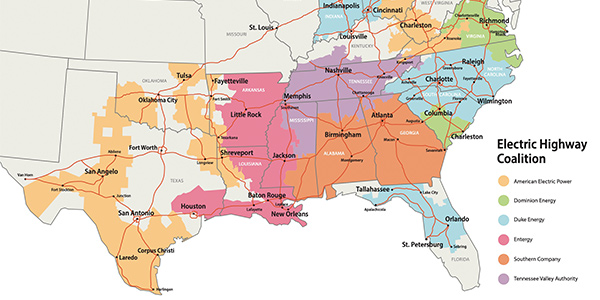Six utilities are banding together to make electric vehicle “range anxiety” a thing of the past with a plan to create “a seamless network” of fast-charging stations along highways stretching from the Atlantic and Gulf coasts to the Midwest.
“Throughout the ages, travelers have had to figure out how to get from Point A to B. From feeding and watering horses, to filling gas tanks and now recharging batteries, ensuring there are convenient places to accomplish these tasks is critical,” said Nicholas Akins, CEO of American Electric Power, one of the six utilities now working together as the Electric Highway Coalition, which announced the plan on Tuesday.
Other members of the coalition include Dominion Energy, Duke Energy, Entergy, Southern Co. and the Tennessee Valley Authority. According to a press release, the goal is to make fast-charging sites as convenient as gas stations, located “along major highway routes with easy highway access and amenities for travelers.” DC fast chargers can top up an EV battery in 20 to 30 minutes, the release says.
The initiative reflects utilities’ growing support for transportation electrification, which they see as a major driver of new electricity demand and infrastructure growth at a time when increasing amounts of renewable and distributed energy on the grid are disrupting traditional industry business and regulatory models. A 2018 report from the Edison Electric Institute predicted the U.S. would see 18 million EVs on the road by 2030.
“We have electric customers in Virginia, North Carolina and South Carolina, and in a lot of cases, those customers are side by side with AEP or Duke or Southern Co. customers,” Dominion spokesperson Rayhan Daudani said. “So, it only makes sense for us to make sure we’re looking for places where we can address the gaps in EV charging infrastructure.”
TVA is looking to put charging stations every 50 miles on Tennessee’s major highways, spokesperson Malinda Hunter said. “What happens when you are on that highway and you exit our service area?” Hunter said. “We don’t want to be building on top of each other. We want to make sure that we have a good standard for what’s expected out of the charging station and how the connection works.”
Scott Blake, spokesperson for AEP, said the utilities have been laying the groundwork for the coalition over the past few months. But, he said, the project is still in its early stages, and any plans will need to take into account the expense and regulatory and operational hurdles an interregional fast-charging network will face.
For example, a $76 million electric transportation plan that Duke proposed in 2019 finally earned partial approval from the North Carolina Utilities Commission in November 2020. Duke got the go-ahead for $25 million to be used for charging stations and an electric school bus program but was sent back to the drawing board to ensure more community involvement — and net benefits for customers — in its EV planning.
Daudani also pointed to the range of EV adoption rates, incentives and other mandates that currently exist state to state. “It’s not one size fits all, either by state or by utility,” he said. “We really do have to be responsive to the customer’s needs, to regulatory needs, to the policy needs that are all in play. There are times where there may be a lack of alignment; that’s when more dialogue needs to be had, and hopefully this collaboration can foster that.”
Open Questions: Time and Cost
Coalition efforts and utility programs promoting transportation electrification have been growing across the country. In July 2020, governors of 15 states and D.C. Mayor Muriel Bowser signed a memorandum of understanding to cut emissions from medium- and heavy-duty trucking. Meanwhile, individual press releases from each of the Electric Highway Coalition members highlighted their various programs to expand EV sales and charging infrastructure.
- AEP noted its own commitment to replacing its fleet of 2,300 cars and light-duty trucks with EVs by 2030, with an expanded charging network to ensure its employees can drive the electric fleet across the utility’s 11-state service territory. Rebates on chargers and low rates for EV charging during off-peak hours are being offered by various of the company’s subsidiary utilities.
- Dominion is also offering special EV charging rates and has a pilot program providing rebates for certain kinds of chargers. It is also helping two public transit systems in its service territory ― one in South Carolina and one in Virginia ― to start converting to electric buses.
- TVA announced an initiative aimed at removing barriers to EV adoption across its seven-state service territory, with the goal of having 200,000 EVs on the road by 2028. The agency is also partnering with the Tennessee Department of Environment and Transportation to build a fast-charging network along the state’s highways.
While none of the utilities have set time frames for rolling out highway fast chargers, Blake and Daudani said AEP and Dominion, respectively, would like to begin installations this year. TVA is aiming for 2022, according to Hunter.
“We’re trying to make sure that each of the member companies can take the resources that they have available and put them to the most efficient use,” Blake said. “We’re really trying to identify the locations for the DC fast-charging infrastructure, where the transmission system and the local distribution system support these types of charging stations without a lot of additional make-ready work.”
How the fast chargers will be paid for, and whether the utilities will try to include them in their rate base remain open questions. Hunter said TVA will not own any of the chargers, while Daudani said Dominion will be looking at the issue on a state-by-state basis.




